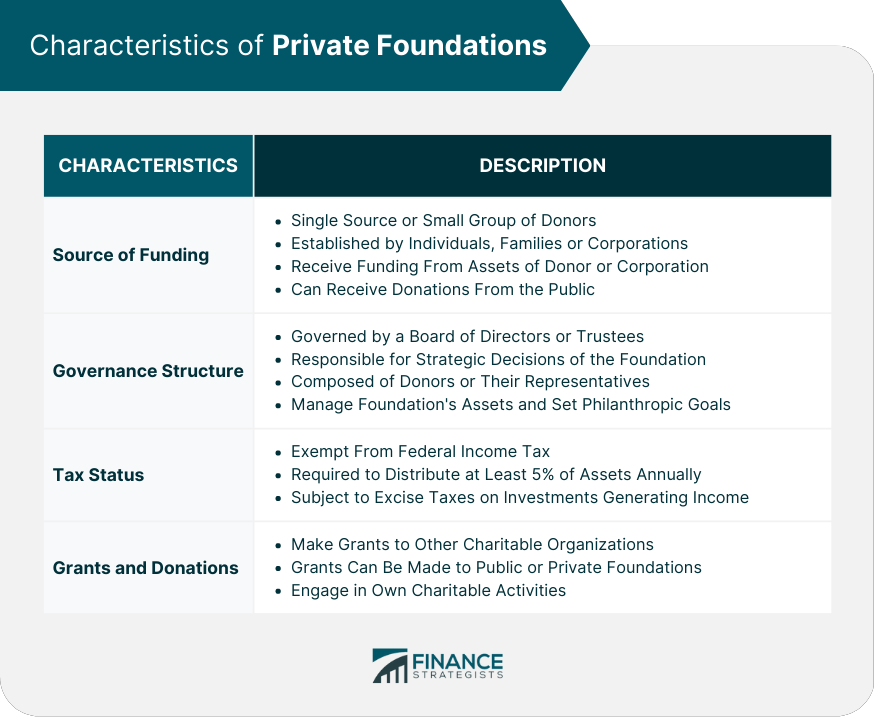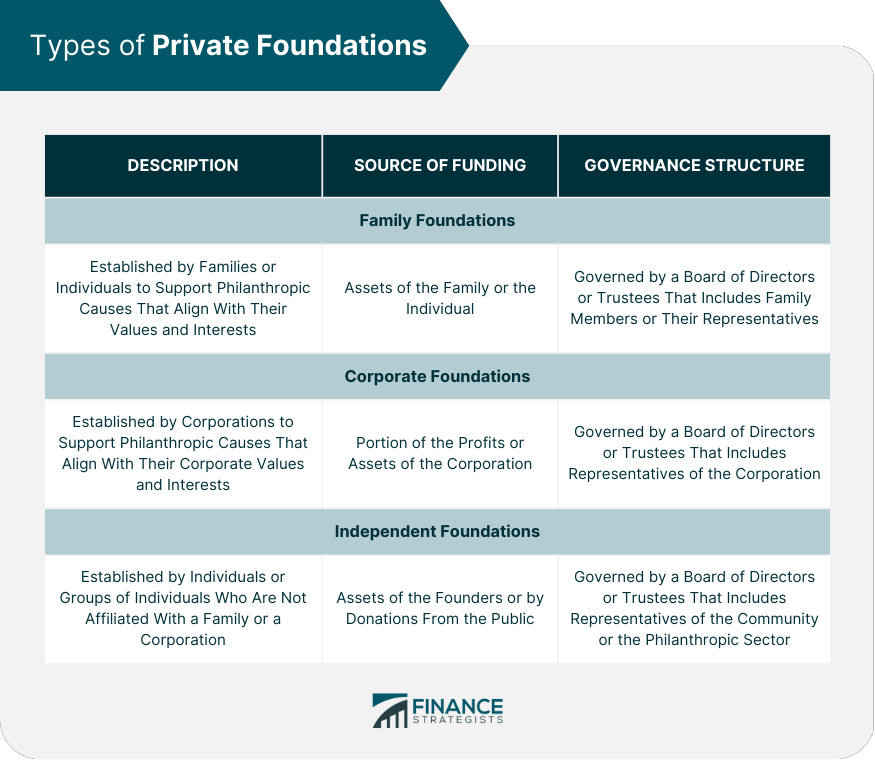Private foundations are charitable organizations that are typically funded by a single source or a small group of donors. They are established to promote a specific philanthropic cause, and they operate by making grants to other charitable organizations or by engaging in their own charitable activities. Private foundations are different from public charities in that they receive most of their funding from a single source or a small group of donors, while public charities receive their funding from a variety of sources. Private foundations are funded by a single source or a small group of donors. They can be established by individuals, families, or corporations, and they receive their funding from the assets of the donor or the corporation. The assets can include cash, stocks, bonds, real estate, or other types of assets. Private foundations can also receive donations from the public, but these donations are not usually a significant source of funding. Private foundations are governed by a board of directors or trustees, who are responsible for making the strategic decisions of the foundation. The board of directors or trustees is usually composed of the donors or their representatives, and they are responsible for managing the assets of the foundation, setting the philanthropic goals of the foundation, and making decisions about which organizations to fund. Private foundations are exempt from paying federal income tax, but they are required to distribute at least 5% of their assets each year in the form of grants to other charitable organizations or by engaging in their own charitable activities. Private foundations are also subject to excise taxes on investments that generate income, such as interest, dividends, or rents. Private foundations make grants to other charitable organizations that are engaged in activities that align with the philanthropic goals of the foundation. The grants can be made to public charities or to other private foundations. Private foundations can also engage in their own charitable activities, such as providing scholarships, funding research, or building facilities. Private foundations have a high degree of flexibility in grant-making. They can choose which organizations to fund, how much to fund them, and for how long to fund them. Private foundations can also provide general operating support or project-specific funding, depending on the needs of the organization. Private foundations provide donors with a high degree of control over how their funds are used. Donors can set the philanthropic goals of the foundation, choose the organizations to fund, and set the grant-making strategy. Private foundations also provide donors with the ability to involve their family members or trusted advisors in the decision-making process. Private foundations offer donors significant tax benefits. Donors can deduct the full fair market value of their contributions to the foundation up to 30% of their adjusted gross income in any given year. Any unused deductions can be carried over for up to five years. Donors can also avoid capital gains taxes by donating appreciated assets to the foundation. Private foundations require a significant amount of administrative work. They are subject to strict reporting and record-keeping requirements, and they must file an annual tax return with the IRS. Private foundations must also maintain a separation between their charitable activities and their business activities. Private foundations are limited in their ability to engage in lobbying or political activity. They cannot support or oppose candidates for public office, and they cannot engage in any activity that attempts to influence legislation. Private foundations can, however, engage in advocacy activities related to their philanthropic goals, such as promoting education, healthcare, or the environment. Private foundations are subject to strict rules related to self-dealing. Self-dealing refers to any transaction between the foundation and a disqualified person, which includes donors, board members, officers, and their family members. Any transaction that benefits a disqualified person is prohibited, and it can result in significant penalties for the foundation and the disqualified person. Family foundations are established by families or individuals to support philanthropic causes that align with their values and interests. Family foundations are typically funded by the assets of the family or the individual, and they are governed by a board of directors or trustees that includes family members or their representatives. Family foundations provide families with a way to engage in philanthropy as a group and to pass on philanthropic values and traditions to future generations. Corporate foundations are established by corporations to support philanthropic causes that align with their corporate values and interests. Corporate foundations are typically funded by a portion of the profits or assets of the corporation, and they are governed by a board of directors or trustees that includes representatives of the corporation. Corporate foundations provide corporations with a way to engage in philanthropy as a part of their corporate social responsibility initiatives. Independent foundations are established by individuals or groups of individuals who are not affiliated with a family or a corporation. Independent foundations are typically funded by the assets of the founders or by donations from the public, and they are governed by a board of directors or trustees that includes representatives of the community or the philanthropic sector. Independent foundations provide individuals with a way to engage in philanthropy and to support causes that align with their personal values and interests. Private foundations must be formed as a nonprofit corporation or a trust, and they must register with the state in which they are established. Private foundations must also apply for tax-exempt status with the IRS by filing Form 1023 or Form 1023-EZ. The IRS reviews the application to determine whether the foundation meets the requirements for tax-exempt status. Private foundations must comply with the rules related to grant-making and compliance. Private foundations must distribute at least 5% of their assets each year in the form of grants to other charitable organizations or by engaging in their own charitable activities. Private foundations must also avoid self-dealing transactions and maintain a separation between their charitable activities and their business activities. Private foundations must comply with the reporting and disclosure requirements related to their tax-exempt status. Private foundations must file an annual tax return with the IRS on Form 990-PF, which includes information about the foundation's assets, income, expenses, and grant-making activities. Private foundations must also disclose certain information on their website, such as their mission statement, grant-making guidelines, and financial statements. The Bill and Melinda Gates Foundation is one of the largest private foundations in the world, with assets of over $50 billion. The foundation was established in 2000 by Bill and Melinda Gates to support global health, education, and poverty alleviation. The foundation has made significant contributions to the eradication of polio, the fight against HIV/AIDS, and the improvement of education in the United States. The Ford Foundation is one of the oldest and largest private foundations in the United States, with assets of over $13 billion. The foundation was established in 1936 by Edsel Ford, the son of Henry Ford, to support social justice, education, and the arts. The foundation has made significant contributions to the civil rights movement, the environmental movement, and the development of public media. The Rockefeller Foundation is another one of the oldest and largest private foundations in the United States, with assets of over $4 billion. The foundation was established in 1913 by John D. Rockefeller, the founder of Standard Oil, to support scientific research, education, and public health. The foundation has made significant contributions to the development of the green revolution, the eradication of hookworm disease, and the improvement of global health. Private foundations are a valuable tool for philanthropy, providing donors with a high degree of control over their charitable contributions and offering significant tax benefits. Private foundations also provide a way for families, corporations, and individuals to engage in philanthropy and to support causes that align with their values and interests. However, private foundations also require a significant amount of administrative work and are subject to strict rules related to grant-making, compliance, and disclosure. Despite these challenges, private foundations have made significant contributions to social, environmental, and cultural causes around the world, and they will continue to play an important role in the philanthropic sector in the years to come. While tax benefits are one of the advantages of establishing a private foundation, it is important to consult with tax services to ensure compliance with the complex tax rules and regulations related to private foundations.What Are Private Foundations?
Characteristics of Private Foundations
Source of Funding
Governance Structure
Tax Status and Requirements
Grants and Donations

Advantages of Private Foundations
Flexibility in Grant-Making
Control Over Funds
Tax Benefits
Disadvantages of Private Foundations
Administrative Burden
Limited Ability to Lobby or Engage in Political Activity
Restrictions on Self-Dealing
Types of Private Foundations
Family Foundations
Corporate Foundations
Independent Foundations

Legal Considerations for Private Foundations
Formation and Registration
Grant-Making and Compliance
Reporting and Disclosure Requirements
Examples of Private Foundations
Bill and Melinda Gates Foundation
Ford Foundation
Rockefeller Foundation
Final Thoughts
Private Foundations FAQs
A private foundation is a charitable organization that is typically funded by a single source or a small group of donors. It is established to promote a specific philanthropic cause, and it operates by making grants to other charitable organizations or by engaging in its own charitable activities.
The advantages of establishing a private foundation include flexibility in grant-making, control over funds, and tax benefits. Private foundations offer donors a high degree of control over how their funds are used and significant tax benefits, such as the ability to deduct the full fair market value of their contributions to the foundation up to 30% of their adjusted gross income in any given year.
The disadvantages of establishing a private foundation include administrative burden, limited ability to lobby or engage in political activity, and restrictions on self-dealing. Private foundations require a significant amount of administrative work, and they are subject to strict rules related to grant-making, compliance, and disclosure.
The types of private foundations include family foundations, corporate foundations, and independent foundations. Family foundations are established by families or individuals to support philanthropic causes that align with their values and interests. Corporate foundations are established by corporations to support philanthropic causes that align with their corporate values and interests. Independent foundations are established by individuals or groups of individuals who are not affiliated with a family or a corporation.
The legal considerations when establishing a private foundation include formation and registration, grant-making and compliance, and reporting and disclosure requirements. Private foundations must be formed as a nonprofit corporation or a trust, and they must register with the state in which they are established. Private foundations must also comply with the rules related to grant-making and compliance and the reporting and disclosure requirements related to their tax-exempt status.
True Tamplin is a published author, public speaker, CEO of UpDigital, and founder of Finance Strategists.
True is a Certified Educator in Personal Finance (CEPF®), author of The Handy Financial Ratios Guide, a member of the Society for Advancing Business Editing and Writing, contributes to his financial education site, Finance Strategists, and has spoken to various financial communities such as the CFA Institute, as well as university students like his Alma mater, Biola University, where he received a bachelor of science in business and data analytics.
To learn more about True, visit his personal website or view his author profiles on Amazon, Nasdaq and Forbes.















